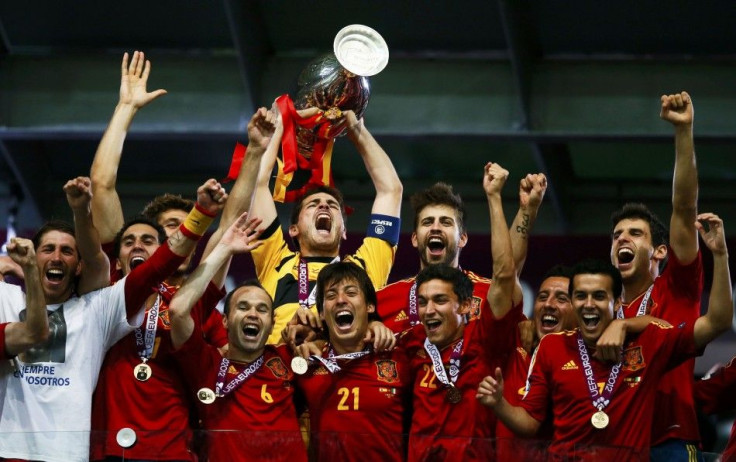Spain Vs. Italy Highlights: 5 Things We Learned From Euro 2012 Final [VIDEO]

Spain entered the record books as they became the first side to retain the European Championship with a stunning 4-0 victory over Italy in Kiev on Sunday. Here are five thoughts on a fitting climax to a enthralling three weeks of action. Scroll down for highlights.
Spain Remain a Class Apart
With the exception of a 4-0 victory over a poor Ireland side, Spain had gone through to the final of Euro 2012 by controlling games through steady possession rather than ripping through the opposition. Against Italy, Spain came out ready to cement their place as the greatest side in the world. The tempo was noticeably higher from the get go and they looked dangerous with every surge forward. While it is Xavi that has for so long been hailed as the fulcrum of the Spanish side, Andres Iniesta fully warranted being recognized as player of the tournament.
The attacking midfielder was the man responsible for upping the pace of Spain's attacks throughout the competition with his ability to suddenly dart at opposition defenders with the ball at his feet. When Spain play like they did for spells in the final, there is no side in the world that can match them.
Italy Should Not be Forgotten
All the attention after the final whistle has focused on a majestic Spanish performance; to a large extent, rightly so. But it would be wrong to claim that 4-0 was a fair reflection of the encounter. Italy started promisingly before struggling to resist Spain's sumptuous flowing attacks. After going a goal down, though, Cesare Prandelli's side were in the ascendency with Spain dropping deep and allowing space for Andrea Pirlo to move into. It was a stunning sucker-punch that caught them, courtesy of Xavi's stunning pass to release Jordi Alba and put Spain 2-0 up just before the break.
Still there was no sign of Italy wilting. Antonio Di Natale should have pulled at least one goal back with two highly presentable chances minutes after coming on at half-time. It wasn't until Italy's final substitute Thiago Motta was forced off injured that the game was ended as a contest. If we are to hail a great Spanish display then it is only right that we pay due respect to the quality of the opposition for helping to make it so.
Xavi Is Still the Pass Master
By his incredibly high standards, Xavi had endured a disappointing tournament up to the final. In comparison to Spain's triumphs at the Euro 2008 and the last World Cup, the midfield metronome had been far less prominent, with Xabi Alonso influencing proceedings with his passing from deep. After struggling with injuries for much of the season at Barcelona, he looked to be struggling to find his best form. Xavi arrived on the big occasion in style, though, playing two glorious assists to Jordi Alba and Fernando Torres.
At 32 years of age can the man that embodies Spain's style more than anyone else still be a major factor in two years' time at the 2014 World Cup?
Fitness Finally Caught Up With the Azzurri
With one of the competition's oldest squads and several injury concerns there had been doubts about Italy's ability to perform to their potential in a semifinal with Germany having had just three days' rest since playing 120 minutes against England. The Azzurri answered those questions in spectacular fashion with a stunningly committed display.
But coming into the final with just a two day break, one less than Spain, fitness finally caught up with Italy. Renowned fitness coach Raymond Verheijen has been outspoken and authored a study suggesting that teams suffer dramatically from having just a two day gap. There was certainly strong supporting evidence for that on Sunday. Antonio Cassano looked desperately short of fitness before being replaced at half time, while Giorgio Chiellini and Thiago Motta were forced off with injuries that eventually led to Italy playing the final 30 minutes with 10 men.
We were tired, very tired, and the injuries show that, said Chiellini. Some of our players on the pitch could hardly walk.
It may not have changed the outcome, but it surely cannot be right to play the most important match in some of these players' careers, where one team is subjected to the disadvantage of receiving just two days of rest.
Greatest of All Time?
In the immediate aftermath of Spain's victory, pundits were quick to decide where this Spain side ranks among the greatest of all time. It is an argument that may be missing the bigger point. In becoming the first side to win three major tournaments in a row, they have achieved a greater feat than merely producing one dominant side.
Eight of the 14 players who appeared for Spain in Sunday's final were also on the field in the victory over Germany in the climax to Euro 2008, but there have been some key changes. Marcos Senna has been replaced as the holding midfielder by the unheralded, but hugely influential Sergio Busquets. Up front, the loss of David Villa to injury and the virtual loss of Fernando Torres--to whatever sad ailment has afflicted the mental side of his game--has been compensated in this tournament by Vicente Del Bosque successfully moving Cesc Fabregas forward into a false nine role. The constant production line of Spanish talent was emphasized by a starring role for young left back Jordi Alba, who now appears a more than adequate replacement for Joan Capdevila.
Producing one great side is hard enough, but to keep producing players capable of reinvigorating the side and still maintaining a relentless hunger for success throughout is a truly historic achievement.
by moorix82
© Copyright IBTimes 2024. All rights reserved.











